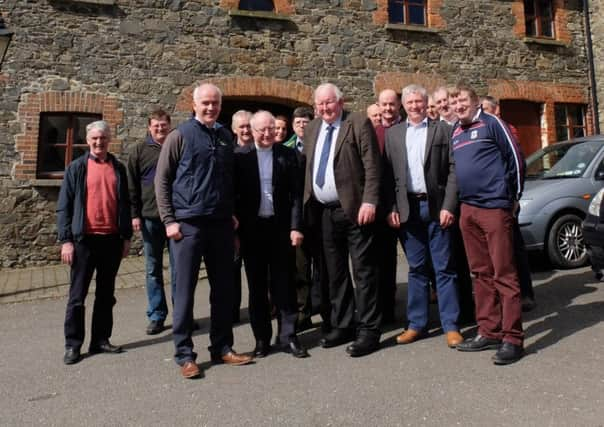Presbyterian Moderator in Cavan visit to agri college


On the agenda were recent flooding, volatile agri-food markets, opportunities for young people and other issues affecting farming families and rural communities, when Dr Ian McNie met with staff, students and farmers.
Attended by over 1,000 students, the College is one of the Republic of Ireland’s leading providers of agriculture and forestry training.
Advertisement
Advertisement
Set in 360 acres of grassland, it is part of Teagasc, the Agricultural and Food Development Authority, the national body that provides integrated research, advisory and training services to the agriculture and food industry and rural communities.
“I am aware that many farmers across the country have been badly affected by a particularly wet winter and a very cold start to spring, which has adversely impacted livelihoods and is still causing problems.
“The widespread flooding that has caused so much disruption and damage to both land and property, reinforces the need for investment in flood defences and long-term planning,” Dr McNie said.
“Many of the issues that we discussed are common to farming communities throughout the island. These included financial pressures, ‘succession’ in family run farms, educational and employment opportunities for young graduates and farm safety.
Advertisement
Advertisement
“I also got a sense of the isolation often felt by farmers and the mental health issues that sometimes arise as a result of the challenges they face. It was therefore good to get the perspective of the teaching staff, students, local farmers and rural community reps who I met.”
Welcoming the visit, college principal John Kelly said that the Moderator had come at an opportune time.
“In many respects it seems like we have had an extended winter. Our own cattle are still inside on account of the wet cold spring and the flooding in December, both of which has severely affected our grass growth, so we are very reliant, for the time being on our stocks of silage and meal.
“We were able to tell Dr McNie how we are managing the situation on the college farm relating to the weather.
Advertisement
Advertisement
“We also had the opportunity to explain the compound effect more generally for rural communities and farm incomes, of the poor weather and poor prices for farm produce, due to oversupply in a time of reduced demand.
“While this is a difficult time, demand to study at the College is high with approximately 10% of students going on to farm full-time.
“The remainder move into the agri-food sector, or use their experience here to better manage their holdings where they farm part-time,” Mr Kelly said.
During his visit, Dr McNie was accompanied by members of the PCI’s Council for Church and Society and the Clerk of the Church’s Monaghan Presbytery. He also met dairy, beef and pig farmers from Counties Donegal, Monaghan and Cavan.
Advertisement
Advertisement
“Farmers and those who work on the land, have for many generations, been the backbone of Ireland.
“I met Northern Ireland farmers and representatives of the farming community back in September, and like then, this visit has been very useful, especially in a pastoral sense,” Dr McNie said.